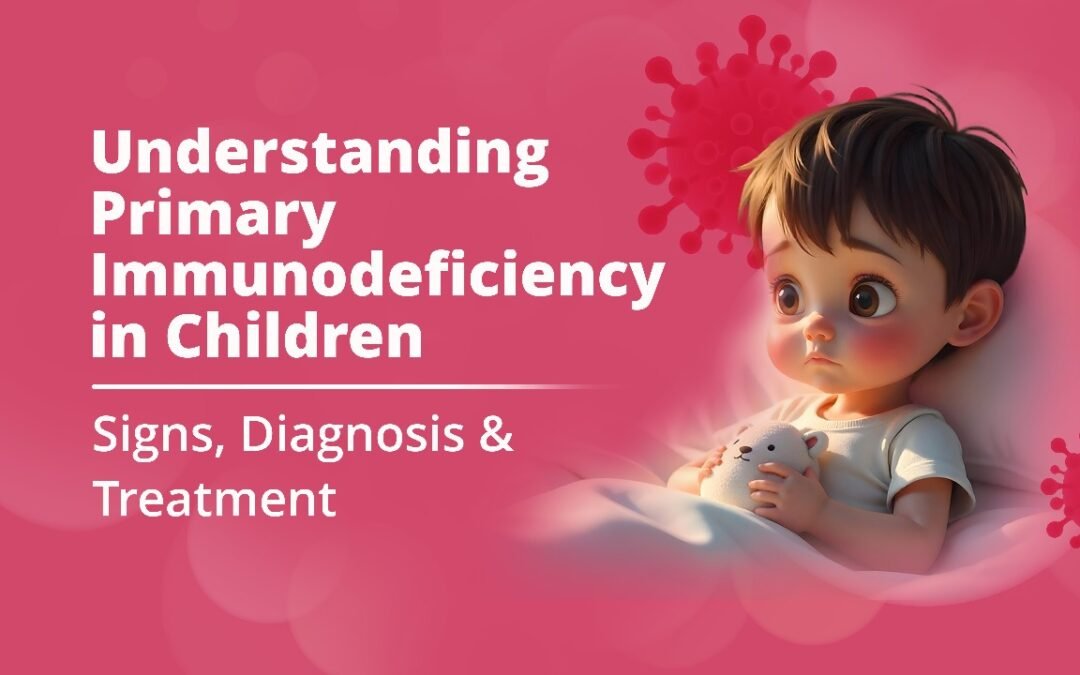Frequent infections in children can be concerning for parents. While it’s normal for young children to catch a cold or flu occasionally, recurrent infections might signal an underlying issue with their immune system. Pediatric immunology is a specialized field that deals with diagnosing and treating immune system disorders in children. Dr. Shraddha Chandak, a trusted pediatrician with expertise in immunology, helps families understand and manage these conditions, providing effective treatments and improving the quality of life for her young patients.
What is Primary Immunodeficiency?
Primary Immunodeficiency (PID) refers to genetic or inherited conditions that weaken the immune system’s ability to fight infections.Unlike acquired immunodeficiencies (like HIV), PIDs are present from birth — though symptoms may appear in infancy, early childhood, or sometimes even later. There are over 300 types of PIDs, and they affect different parts of the immune system, including:
- Antibody production (B cells)
- T-cell functions
- Phagocyte activity
- Complement system
Early identification and management are critical to prevent repeated infections, organ damage, and developmental issues.
8 Warning Signs of PID in Children
As a parent, it’s essential to recognize when your child’s frequent illnesses are not just “normal.” Here are red flags to look out for:
- Eight or more new ear infections in one year
- Two or more serious sinus infections within a year
- Two or more months on antibiotics with little effect
- Failure to gain weight or grow normally
- Recurrent deep skin or organ abscesses
- Persistent thrush or fungal infections
- Need for IV antibiotics to clear infections
- A family history of primary immunodeficiency
If your child exhibits two or more of the above, it’s time to consult a pediatric immunologist for evaluation.
How is PID Diagnosed?
Diagnosis involves a step-by-step evaluation by a specialist like Dr. Shraddha Chandak, using the following tools:
- Detailed Medical History: Frequency, type, and duration of infections
- Physical Examination
- Blood Tests: Immunoglobulin levels, white cell counts, etc.
- Genetic Testing: For confirmation of inherited forms
The process ensures not just detection, but classification of the type of PID — which is vital to choosing the right treatment.

Treatment Options for Primary Immunodeficiency
Treatment depends on the type and severity of PID and may include:
- Antibiotics & Antifungals :- To prevent or treat recurrent infections.
- Immunoglobulin (IVIG or SCIG) Therapy :- To replace missing antibodies and boost immunity.
- Hematopoietic Stem Cell Transplant (Bone Marrow Transplant) :- For severe cases like SCID (Severe Combined Immunodeficiency).
- Gene Therapy (emerging option) :- Still in the research stage for specific PID types.
- Lifestyle Support :-
- Nutritional guidance
- Proper vaccinations (excluding live vaccines in some cases)
- Good hygiene and early treatment of infections
With consistent care, children with PID can lead normal, active lives.
Dr. Shraddha Chandak – Pediatric Immunology Expertise in Aurangabad
As one of the few specialists in Pediatric Hematology, Oncology & Immunology in the region, Dr. Shraddha Chandak offers comprehensive care for children with complex immune and blood disorders. Her approach includes:
✅ Precise Diagnosis
✅ Personalized Treatment Plans
✅ Regular Monitoring & Counselling
✅ Support for Family & Caregivers
Backed by global training from Manipal, NHS (UK), and Medstar Hospital (USA), she brings international-grade expertise to Aurangabad families.

Why Early Detection Matters
Primary Immunodeficiencies can be life-threatening if not addressed early. They can also mimic common illnesses — which is why they often go undiagnosed for years.
An early visit to a pediatric immunologist can:
- Prevent permanent organ damage
- Improve long-term immunity
- Reduce hospital visits
- Offer a better quality of life to your child
Conclusion
If your child suffers from unusual or frequent infections, don’t ignore the signs. Early consultation with a pediatric immunology expert could be life-changing. Dr. Shraddha Chandak, based in Aurangabad, is here to help you navigate this journey with medical precision, empathy, and ongoing support.

